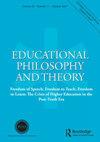情境意义之外:从杜威的审美经验到深度学习的感性抽象
IF 1.8
4区 教育学
Q2 EDUCATION & EDUCATIONAL RESEARCH
引用次数: 0
摘要
摘要本文试图介绍一种被称为“感性抽象”的意义生成过程,作为一种符合杜威哲学的审美经验方法。杜威强调审美体验是最好的体验形式,它融合了情感和智力品质,促进了深度学习和洞察力。基于对感觉、情感和人类大脑的当代研究,本文确定了人类理解的两种不同模式:语言/概念系统和感官-想象系统。前者通常与抽象和智力思维联系在一起,在传统的学校教育中被大量强调,而后者作为人类认知的一部分,却被可悲地忽视和忽视了。虽然情境意义提供了一种连接两个系统的方式,但它往往无法引导审美体验。作为回应,感官抽象可以促进一个意义制造过程,这个过程变得比感觉更普遍,但永远不会像语言范畴那样普遍,同时保持审美经验所要求的感觉整体性。本文以一件经典艺术作品为例,认为感官抽象可以作为教育者创造学习体验的一种方式,将感官体验与归纳、抽象相结合,从而产生审美体验。关键词:审美体验;约翰·杜威;感官抽象;情境意义;作者说明:qing Archer ZhangQing Archer Zhang,亚利桑那州立大学玛丽卢富尔顿师范学院学习、文学和技术博士。目前,她从事人类学习、体验设计和媒体研究的交叉研究。本文章由计算机程序翻译,如有差异,请以英文原文为准。
Beyond situational meaning: From Dewey’s aesthetic experience to sensuous abstraction for deep learning
AbstractThis paper seeks to introduce a meaning-making process called ‘sensuous abstraction’ as one approach to aesthetic experience in line with Dewey’s philosophy. Dewey highlights aesthetic experience as the best form of experience that integrates emotional and intellectual qualities to foster deep learning and insights. Building on contemporary research on sensation, affect, and human brain, this paper identifies two distinct modes of human understanding: the linguistic/conceptual system and the sensuous-imaginative system. The former, often associated with abstraction and intellectual thinking, is heavily emphasized in traditional schooling, but the latter, integral to human cognition, is sadly neglected and overlooked. While situational meaning offers a way to bridge the two systems, it often falls short of leading to aesthetic experience. In response, sensuous abstraction can promote a process of meaning making that becomes more general than sensation but never as general as linguistic categories while maintaining its sensory wholeness as aesthetic experience demands. Using a classical artwork as an example, this paper concludes sensuous abstraction can be adopted as one approach for educators to create learning experiences by integrating sensory experience and generalizations and abstractions that lead to aesthetic experience.Keywords: Aesthetic experienceJohn Deweysensuous abstractionsituational meaning Disclosure statementNo potential conflict of interest was reported by the author(s).Additional informationNotes on contributorsQing Archer ZhangQing Archer Zhang PhD in Learning, Literacies, and Technologies from Mary Lou Fulton Teachers College at Arizona State University. Currently she works at the intersection of human learning, experience design, and media studies.
求助全文
通过发布文献求助,成功后即可免费获取论文全文。
去求助
来源期刊

Educational Philosophy and Theory
EDUCATION & EDUCATIONAL RESEARCH-
CiteScore
4.20
自引率
15.00%
发文量
171
期刊介绍:
Educational Philosophy and Theory publishes articles concerned with all aspects of educational philosophy. It will also consider manuscripts from other areas of pure or applied educational research. In this latter category the journal has published manuscripts concerned with curriculum theory, educational administration, the politics of education, educational history, educational policy, and higher education. As part of the journal''s commitment to extending the dialogues of educational philosophy to the profession and education''s several disciplines, it encourages the submission of manuscripts from collateral areas of study in education, the arts, and sciences, as well as from professional educators. Nevertheless, manuscripts must be germane to the ongoing conversations and dialogues of educational philosophy.
 求助内容:
求助内容: 应助结果提醒方式:
应助结果提醒方式:


